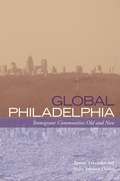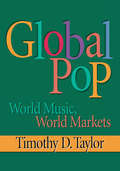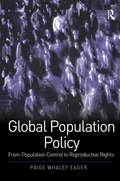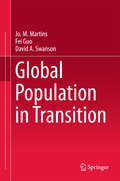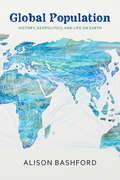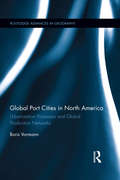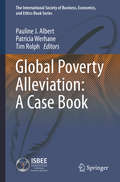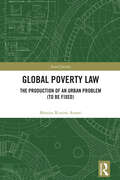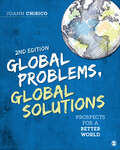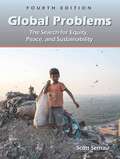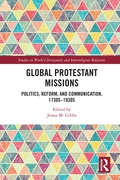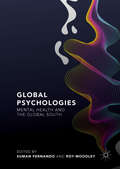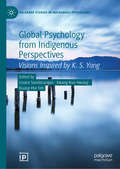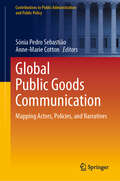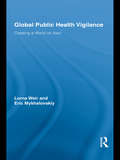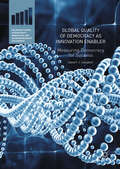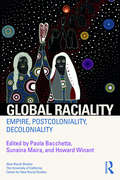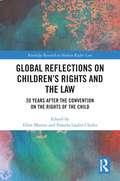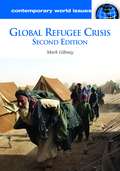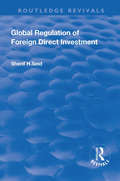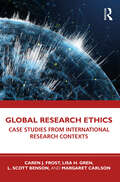- Table View
- List View
Global Philadelphia: Immigrant Communities Old and New
by Mary Johnson Takenaka Ayumi OsirimThe racial and ethnic composition of Philadelphia continues to diversify as a new wave of immigrants—largely from Asia and Latin America—reshape the city’s demographic landscape. Moreover, in a globalized economy, immigration is the key to a city’s survival and competitiveness. The contributors to Global Philadelphiaexamine how Philadelphia has affected its immigrants’ lives, and how these immigrants, in turn, have shaped Philadelphia. Providing a detailed historical, ethnographic, and sociological look at Philadelphia’s immigrant communities, this volume examines the social and economic dynamics of various ethnic populations. Significantly, the contributors make comparisons to and connections between the traditional immigrant groups—Germans, Italians, the Irish, Jews, Puerto Ricans, and Chinese—and newer arrivals, such as Cambodians, Haitians, Indians, Mexicans, and African immigrants of various nationalities. While their experiences vary, Global Philadelphia focuses on some of the critical features that face all immigrant groups—intra-group diversity, the role of institutions, and ties to the homeland. Taken together, these essays provide a richer understanding of the processes and implications of contemporary immigration to the area.
Global Pop: World Music, World Markets
by Timothy D TaylorGlobal Pop examines the rise of "world musics" and "world beat", and some of the musicians associated with these recent genres such as Peter Gabriel, Ladysmith Black Mambazo, and Johnny Clegg. Drawing on a wide range of sources - academic, popular, cyber, interviews, and the music itself - Global Pop charts an accessible path through many of the issues and contradictions surrounding the contemporary movement of people and musics worldwide. Global Pop examines the range of discourses employed in and around world music, demonstrating how the central concept of authenticity is wielded by musicians, fans, and other listeners, and looks at some of these musics in detail, examining ways they are caught up in forms of domination and resistance. The book also explores how some cross-cultural collaborations may fashion new musics and identities through innovative combinations of sounds and styles.
Global Population Policy: From Population Control to Reproductive Rights (Global Health)
by Paige Whaley EagerThe general assumption throughout history has been that a growing population is beneficial for societies. By the mid-1960s, however, the United States and other developed countries became convinced that population control was an absolute necessity, especially in the developing world. This absorbing study explains why population control is no longer the focus of global population policy and why reproductive rights and health have become the major focus. The book highlights the role that the US and other developed countries play in affecting global population policy, looking in particular at the stance of the George W. Bush administration since taking office. It also studies the influence of the UN as an international forum and explores how civil society questioned the ethics of population control. Global Population Policy will appeal to a wide audience, including readers in the fields of women's studies, development politics and international relations.
Global Population in Transition
by David A. Swanson Jo. M. Martins Fei GuoThis book deals with macro and micro aspects of population change and their inter-face with socio-economic factors and impact. It examines theoretical notions and pursues their empirical manifestations and uses multidisciplinary approaches to population change and diversity. It investigates the organic nature of the relationships between socio-economic factors and population change and the feedback loops that affect socio-economic organisation and behaviour. The book brings together material often scattered in a number of sources and disciplines that helps to understand population change and their socio-economic aspects. In addition to dealing with the more conventional factors in population dynamics in the form of fertility, mortality and migration, the book examines socio-economic forces that influence them. It discusses population evolving attributes that affect population characteristics and social and behaviour and impact on the environment. Further, it deals with social organisation and pathways that lead to different social and economic development and standards of living of diverse populations.
Global Population: History, Geopolitics, and Life on Earth
by Alison BashfordConcern about the size of the world's population did not begin with the "population bomb" in 1968. It arose in the aftermath of World War I and was understood as an issue with far-reaching ecological, agricultural, economic, and geopolitical consequences. The world population problem concerned the fertility of soil as much as the fertility of women, always involving both "earth" and "life." Global Population traces the idea of a world population problem as it evolved from the 1920s through the 1960s. The growth and distribution of the human population over the planet's surface came deeply to shape the characterization of "civilizations" with different standards of living. It forged the very ideas of development, demographically defined three worlds, and, for some, an aspirational "one world." Drawing on international conference transcripts and personal and organizational archives, this book reconstructs the twentieth-century population problem in terms of migration, colonial expansion, globalization, and world food plans. Population was a problem in which international relations and intimate relations were one. Global Population ultimately shows how a geopolitical problem about sovereignty over land morphed into a biopolitical solution, entailing sovereignty over one's person.
Global Population: History, Geopolitics, and Life on Earth (Columbia Studies in International and Global History)
by Alison BashfordConcern about the size of the world's population did not begin with the "population bomb" in 1968. It arose in the aftermath of World War I and was understood as an issue with far-reaching ecological, agricultural, economic, and geopolitical consequences. The world population problem concerned the fertility of soil as much as the fertility of women, always involving both "earth" and "life."Global Population traces the idea of a world population problem as it evolved from the 1920s through the 1960s. The growth and distribution of the human population over the planet's surface came deeply to shape the characterization of "civilizations" with different standards of living. It forged the very ideas of development, demographically defined three worlds, and, for some, an aspirational "one world."Drawing on international conference transcripts and personal and organizational archives, this book reconstructs the twentieth-century population problem in terms of migration, colonial expansion, globalization, and world food plans. Population was a problem in which international relations and intimate relations were one. Global Population ultimately shows how a geopolitical problem about sovereignty over land morphed into a biopolitical solution, entailing sovereignty over one's person.
Global Port Cities in North America: Urbanization Processes and Global Production Networks (Routledge Advances in Geography #13)
by Boris VormannAs the material anchors of globalization, North America’s global port cities channel flows of commodities, capital, and tourists. This book explores how economic globalization processes have shaped these cities' political institutions, social structures, and urban identities since the mid-1970s. Although the impacts of financialization on global cities have been widely discussed, it is curious that how the global integration of commodity chains actually happens spatially — creating a quantitatively new, global organization of production, distribution, and consumption processes — remains understudied. The book uses New York City, Los Angeles, Vancouver, and Montreal as case studies of how once-redundant spaces have been reorganized, and crucially, reinterpreted, so as to accommodate new flows of goods and people — and how, in these processes, social, environmental, and security costs of global production networks have been shifted to the public.
Global Poverty Alleviation: A Case Book
by Patricia Werhane Pauline J. Albert Tim RolphThis case book provides examples of multi-stakeholder partnerships that aim to create sustainable enterprises for both the for-profit sectors and for individuals who live in conditions of poverty. Ideal for teaching, after a brief introduction to the case method, the cases are presented as descriptions with no comments or criticisms. The cases are arranged thematically and cover a broad array of solutions in diverse countries including India, Bangladesh, Vietnam, Tanzania, the United States, South Africa, Mozambique, Peru, Ghana, Haiti,and Mexico. Specific programs for alleviating--or even eradicating--poverty through profitable partnerships come from myriad sectors such as banking, health, education, infrastructure development, environment, and technology. The cases highlight solutions that focus on bringing about substantive shifts in the conditions of life for those living in poverty.
Global Poverty Law: The Production of an Urban Problem (To Be Fixed) (ISSN)
by Moniza Rizzini AnsariThis book demonstrates how the various legal efforts employed to eradicate global urban poverty also play a significant role in shaping it.Urban poverty has been widely examined as a social problem that requires attention and social commitment. Law is often seen as both an important contributor to the problem as well as a source of crucial tools to overcome it. In spite of this, however, poverty is surprisingly disregarded within legal scholarship. This book counters this by drawing on legal theory, legal history, and legal geography to inquire how urban poverty is made visible and invisible as a problem across global cities. More specifically, it investigates the mechanisms and networks through which global urban poverty has been conceptually and materially shaped in a way that fits the remit of global corporate philanthropy and the development aid agenda. By following law’s circuitous interactions with poverty knowledge and antipoverty interventions, the book demonstrates how it plays a historical role in making poverty seen, known, and remedied. As a result, the book argues, law consolidates a stable image of poverty as an essential ‘problem’ – to be uniformly found worldwide and so reasonably fixable with the appropriate legal reforms. Taking poverty to be a fundamental manifestation of social injustice, the book thus raises key questions about the role of law in the achievement of social justice.This innovative and insightful account of the relationship between law and poverty will appeal to scholars in critical and socio-legal studies, as well as others working in poverty studies, urban studies, development studies, geography, sociology, and social policy.
Global Powers
by Ralph SchroederMichael Mann is a central figure in contemporary sociology. His analysis of how the four sources of social power - ideological, economic, military and political - have shaped world history is a major contribution to social science. In this volume, distinguished scholars assess Mann's work, focusing on his final two volumes of Sources of Social Power, which deal with the twentieth and twenty-first centuries. They tackle some of the major themes in Mann's work including globalisation, American empire and the recent financial crisis. They also question his stance on some perennial topics in sociology: is the trajectory of American society 'exceptional'? How is military power different from the other sources of power? What is the role of agency and ideology in social change? How do the relations between states affect domestic social development? Global Powers will provoke debate among all those interested in understanding the next phase of globalisation.
Global Problems, Global Solutions: Prospects for a Better World
by JoAnn A. ChiricoGlobal Problems, Global Solutions: Prospects for a Better World approaches social problems from a global perspective with an emphasis on using one’s sociological imagination. Perfect for instructors who involve students in research, this text connects problems borne by individuals to regional, global and historical forces, and stresses the importance of evidence in forming opinions and policies addressing social issues. The Second Edition explores three broad themes--nourishing human capital, restoring civility, and sustaining natural and manufactured environments--as it examines the causes and consequences of a range of problems related to economic inequality, discrimination and persecution, war and violence, food production, population flows, health and longevity, the environment, and other issues that we encounter in our lives. The book concludes with a chapter on politics and government, underscoring the need for good governance at all levels–and cooperation among many layers of government–to build a better world.
Global Problems, Global Solutions: Prospects for a Better World
by JoAnn A. ChiricoGlobal Problems, Global Solutions: Prospects for a Better World approaches social problems from a global perspective with an emphasis on using one’s sociological imagination. Perfect for instructors who involve students in research, this text connects problems borne by individuals to regional, global and historical forces, and stresses the importance of evidence in forming opinions and policies addressing social issues. The Second Edition explores three broad themes--nourishing human capital, restoring civility, and sustaining natural and manufactured environments--as it examines the causes and consequences of a range of problems related to economic inequality, discrimination and persecution, war and violence, food production, population flows, health and longevity, the environment, and other issues that we encounter in our lives. The book concludes with a chapter on politics and government, underscoring the need for good governance at all levels–and cooperation among many layers of government–to build a better world.
Global Problems: The Search for Equity, Peace, and Sustainability
by Scott SernauScott Sernau's clear writing and vivid examples help readers to understand their role as global citizens. Part one begins with the challenges of inequality in life chances, wages and work, and gender and education; inequality lies at the heart of many global problems. Part two focuses on conflict and violence—from crime to politics, terrorism to war—with an emphasis on connections of violence to social justice and human rights. Part three looks at sustainability and the problems of urbanization, crowding, and environmental destruction. Each chapter begins with a "Global Encounters" vignette that provides examples of college students encountering striking situations and being asked to think about broader implications. Though people across the globe lead seemingly very different lives, the author emphasizes interconnectedness, with discussions of the local–global connection. Chapters explore social problems by considering key theories, both classical and contemporary, and by providing enough history to understand the background of contemporary issues. The book's approach is both multinational and multidisciplinary. <p><p>Chapters conclude with positive possibilities for global change. While problems are substantial, many people are working to make a difference, and this book offers an invitation to participate. In addition to "Key Ideas" and "For Review and Discussion," every chapter concludes with "Making Connections" that offers reliable websites for more information and "Making a Difference," which provides options for involvement. These sections can form the basis for assignments, for further study, or for class or group projects.
Global Protestant Missions: Politics, Reform, and Communication, 1730s-1930s (Studies in World Christianity and Interreligious Relations)
by Jenna M. GibbsThe book investigates facets of global Protestantism through Anglican, Quaker, Episcopalian, Moravian, Lutheran Pietist, and Pentecostal missions to enslaved and indigenous peoples and political reform endeavours in a global purview that spans the 1730s to the 1930s. The book uses key examples to trace both the local and the global impacts of this multi-denominational Christian movement. The essays in this volume explore three of the critical ways in which Protestant communities were established and became part of a worldwide network: the founding of far-flung missions in which Western missionaries worked alongside enslaved and indigenous converts; the interface between Protestant outreach and political reform endeavours such as abolitionism; and the establishment of a global epistolary through print communication networks. Demonstrating how Protestantism came to be both global and ecumenical, this book will be a key resource for scholars of religious history, religion and politics, and missiology as well as those interested in issues of postcolonialism and imperialism.
Global Psychologies: Mental Health and the Global South
by Roy Moodley Suman FernandoThis book critiques our reliance on Eurocentric knowledge in the education and training of psychology and psychiatry. Chapters explore the diversity of ‘constructions of the self’ in non-Western cultures, examining traditional psychologies from Africa, Asia, Australasia, and Pre-Columbian America. The authors discuss liberation psychologies and contemporary movements in healing and psychological therapy that draw on both Western and non-Western sources of knowledge. A central theme confronted is the importance, in a rapidly shrinking world, for knowledge systems derived from diverse cultures to be explored and disseminated equally. The authors contend that for this to happen, academia as a whole must lead in promoting cross-national and cross-cultural understanding that is free of colonial misconceptions and prejudices. This unique collection will be of value to all levels of study and practice across psychology and psychiatry and to anyone interested in looking beyond Western definitions and understandings.
Global Psychology from Indigenous Perspectives: Visions Inspired by K. S. Yang (Palgrave Studies in Indigenous Psychology)
by Kwang-Kuo Hwang Louise Sundararajan Kuang-Hui YehThis volume celebrates the visions of a more equitable global psychology as inspired by the late Professor K. S. Yang, one of the founders of the indigenous psychology movement. This unprecedented international debate among leaders in the field is essential for anyone who wishes to understand the movement from within—the thinking and the vision of those who are the driving forces behind the movement. This book should appeal to scholars and students of psychology, sociology, anthropology, ethnology, philosophy of science, and postcolonial studies.
Global Public Goods Communication: Mapping Actors, Policies, and Narratives (Contributions to Public Administration and Public Policy)
by Sónia Pedro Sebastião Anne-Marie CottonThis book examines the critical role of communication in advancing knowledge and participation in the governance of global public goods (GPG). Central to any theory of GPG is the role of information, as raising awareness requires creating credible messages and narratives. The book highlights the importance of agency, understanding actors, their interconnections, and how they negotiate and govern GPG. The book argues for a nuanced understanding of democracy, suggesting a broader interpretation that prioritizes public deliberation and reflection. Key premises include the necessity of institutional legitimacy, active citizen participation, structured partnerships, and transparent communication channels for sustainable development. The book underscores that communication is fundamental to change processes, sustainable citizenship, and the realization of human rights, including the right to information and freedom of expression. By doing so, it advocates for an eighteenth Sustainable Development Goal: responsible communication. The book will appeal to students, scholars, and researchers of international relations, communication, and public policy, as well as to policy-makers and professionals at international organizations, think tanks, and NGOs seeking theoretical foundations for communication strategies and stakeholder engagement practices.
Global Public Health Vigilance: Creating a World on Alert (Routledge Studies in Science, Technology and Society)
by Lorna Weir Eric MykhalovskiyGlobal Public Health Vigilance is the first sociological book to investigate recent changes in how global public health authorities imagine and respond to international threats to human health. This book explores a remarkable period of conceptual innovation during which infectious disease, historically the focus of international disease control, was displaced by "international public health emergencies," a concept that brought new responsibilities to public health authorities, helping to shape a new project of global public health security. Drawing on research conducted at the World Health Organization, this book analyzes the formation of a new social apparatus, global public health vigilance, for detecting, responding to and containing international public health emergencies. Between 1995 and 2005 a new form of global health surveillance was invented, international communicable disease control was securitized, and international health law was fundamentally revised. This timely volume raises critical questions about the institutional effects of the concept of emerging infectious diseases, the role of the news media in global health surveillance, the impact of changes in international health law on public health reasoning and practice, and the reconstitution of the World Health Organization as a power beyond national sovereignty and global governance. It initiates a new research agenda for social science research on public health.
Global Quality of Democracy as Innovation Enabler: Measuring Democracy for Success (Palgrave Studies in Democracy, Innovation, and Entrepreneurship for Growth)
by David F.J. CampbellThis book assesses the interconnectedness of democracy and economic development. It concentrates on how to conceptualize and to measure democracy and quality of democracy in global comparison. The author makes the argument that a quality-of-democracy understanding based on sustainable development relates crucially with economic growth, but more so with economic development. The empirical macro-model focuses on approximately over hundred countries (in a world model) and covers about a fourteen-year period of 2002-2015, identifying the following basic dimensions as being relevant for further analysis: freedom, equality, control, sustainable development, and self-organization (political self-organization). Readers will appreciate the global perspective the work offers.
Global Raciality: Empire, PostColoniality, DeColoniality (New Racial Studies)
by Sunaina Maira Howard Winant Paola BacchettaGlobal Raciality expands our understanding of race, space, and place by exploring forms of racism and anti-racist resistance worldwide. Contributors address neoliberalism; settler colonialism; race, class, and gender intersectionality; immigrant rights; Islamophobia; and homonationalism; and investigate the dynamic forces propelling anti-racist solidarity and resistance cultures. Midway through the Trump years and with a rise in nativism fervor across the globe, this expanded approach captures the creativity and variety found in the fight against racism we see the world over. Chapters focus on both the immersive global trajectories of race and racism, and the international variation in contemporary configurations of racialized experience. Race, class, and gender identities may not only be distinctive, they can extend across borders, continents, and oceans with remarkable demonstrations of solidarity happening all over the world. Palestinians, Black Panthers, Dalit, Native Americans, and Indian feminists among others meet and interact in this context. Intersections between race and such forms of power as colonialism and empire, capitalism, gender, sexuality, religion, and class are examined and compared across different national and global contexts. It is in this robust and comparative analytical approach that Global Raciality reframes conventional studies on postcolonial regimes and racial identities and expression.
Global Reflections on Children’s Rights and the Law: 30 Years After the Convention on the Rights of the Child (Routledge Research in Human Rights Law)
by Ellen Marrus Pamela Laufer-UkelesThirty years after the adoption of the UN Convention of the Rights of the Child, this book provides diverse perspectives from countries and regions across the globe on its implementation, critique and potential for reform. The book revolves around key issues including progress in implementing the CRC worldwide; how to include children in legal proceedings; how to uphold children’s various civil rights; how to best assist children at risk; and discussions surrounding children’s identity rights in a changing familial order. Discussion of the CRC is both compelling and polarizing and the book portrays the enthusiasm around these topics through contrasting and comparative opinions on a range of topics. The work provides varying perspectives from many different countries and regions, offering a wealth of insight on topics that will be of significant interest to scholars and practitioners working in the areas of children’s rights and justice.
Global Refugee Crisis: A Reference Handbook (Second Edition) (Contemporary World Issues Series)
by Mark GibneyThere are two disparate components to the global refugee crisis: first, there are about 46 million refugees and Internally Displaced Persons (IDPs), most of whom are struggling to survive in the poorest and most violent countries in the world, and second, our interpretation of international human rights law allows this state of affairs to worsen. <p><p> Refugee protection has been a longstanding policy that ostensibly protects victims of human rights violations from other countries. In actuality, protection is largely negated by systematic efforts by industrialized states to reduce the number of refugees arriving at the borders. This book provides a comprehensive examination of this worldwide problem and rejects the idea that the majority of asylum seekers abuse the system to gain entrance into the country.
Global Regulation of Foreign Direct Investment (Routledge Revivals)
by Sherif H SeidThis title was first published in 2002: After the failure of the Multilateral Agreement on Investment (MAI), the world does not have a global investment agreement that would regulate FDI. A global investment agreement dealing with FDI would clearly fill a large gap in the network of regulatory measures governing the world economy. Other attempts had been made prior to the MAI to address this problem, but all have failed so far. The main reason for such failures has always been the lack of compromise in the positions held by the major stakeholders. This book analyses the pros and cons of these opposing positions and uses them as a basis for forging a hybrid model called "Regulated Openness".
Global Research Ethics: Case Studies from International Research Contexts
by Caren J. Frost Lisa H. Gren L. Scott Benson Margaret CarlsonGlobal Research Ethics is a guide for students and their instructors as well as practitioners and researchers to understand topics linked to research ethics from a more global perspective. Research plays a key role in identifying health disparity trends and evaluating interventions to improve the health and well-being of the populations at the individual, local, national, and global levels. Conducting ethically sound research is imperative in these contexts. This book (a) uses case studies to offer examples of current research ethical dilemmas and (b) considers regulatory and cultural frameworks in a number of country contexts that highlight diverse methods of identifying and managing these ethical dilemmas. Chapters cover different types (groups) of participants, issues in research, and ways of doing research; then each chapter looks at least three exemplar case studies with at least two analytical commentaries. Case studies include health and social care research, and originate from countries such as Brazil, Chile, South Africa, Botswana, Australia and New Zealand, as well as the U.S. and U.K. The different viewpoints showcased will allow for dialogue to ensue about the ways in which populations and topics in research need to be conceptualized. Global Research Ethics is suitable for all undergraduates and postgraduates on research methods courses in the social and health sciences. It provides academic researchers, students, and community partners with guidelines to reflect on as they develop their own research studies.
